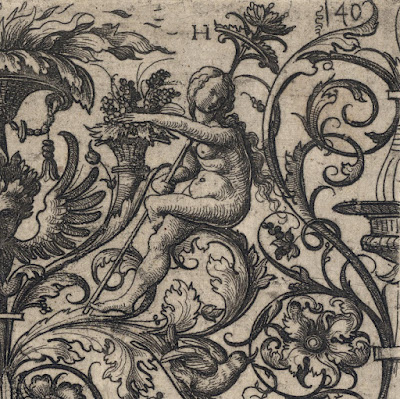Daniel Hopfer (1471–1536)
“Ornamental Fillet with Neptune and
Ceres”, c1520s, from the Funck edition (signified by the number “140” inscribed
on plate at upper right).
Iron etching on laid paper with small margins
backed on a support sheet.
Size: (sheet) 9.8 x 14.5 cm; (plate) 8.5
x 13.7 cm
Signed on plate with the artist’s
initials: (upper left) “D”; (upper right) “H”
Numbered on plate with the Funck edition
number; (upper right) “140”
State ii (of iii)
TIB 17(8).105(499) (Walter L Strauss & Robert A Koch [eds.] 1981,
“The Illustrated Bartsch: Early German Masters”, vol. 17, p. 178); Bartsch
VIII.499.105 (Adam Bartsch 1803, “Le Peintre graveur”, vol. VIII, Vienna, p.
499); Hollstein XV. 116 II/II (F W H Hollstein 1954, “German engravings,
etchings and woodcuts c.1400-1700”, vol. XV, Amsterdam, p. 138).
The British Museum offers the following
description of this print:
“Ornament fillet with Neptune and Ceres;
seated on tendrils on either side of a grotesque winged figure below a burning
torch.”
See also the description of the print at
the Rijksmuseum:
“Flat decoration. In the middle a cherub
between two horns of plenty.”
Condition: a strong, richly inked and well-printed
impression with small margins in near faultless condition for its considerable
age (i.e. there are no tears, holes, creases, abrasions, stains or foxing) and backed
with a support sheet of archival (millennium quality) washi paper.
I am selling this superb etching taken
from an iron plate by the artist who history has accredited with creating the
first etching on paper (as opposed to etching on armour)
for AU$343 (currently US$260.08/EUR221.20/GBP195.08 at the time of this
listing) including postage and handling to anywhere in the world (but not, of
course, any import duties/taxes imposed by some countries).
If you are interested in purchasing this
rare, early and nearly faultless impression, please contact me
(oz_jim@printsandprinciples.com) and I will send you a PayPal invoice to make
the payment easy.
This print has been sold
Hopfer’s etchings have always been
highly sought after. A part of the reason is that they are the first etchings
ever created—at least in terms of prints on paper rather than etched designs on
armour—and, as examples of being the first etchings, are “must have” prints in
any collection. Beyond the curiosity value, however, Hopfer’s designs are simply
superb as can be seen here.
Regarding the history behind the
reprinting of Hopfer’s plates, TIB offers the following information:
“Many of the etched iron plates of the
Hopfers survived their lifetimes and were reprinted much later. In the 17th
century a Nuremberg publisher named David Funck numbered 230 of these plates
and issued a volume entitled ‘Opera Hopferiana.’ In 1802 a publisher named C.
Wilhelm Silberberg in Frankfurt-am-Main reissued 92 plates with the Funck
numbers in a volume with he also entitled ‘Opera Hopferiana.’ The plates were
printed on unnumbered pages of a heavy wove paper.” (Robert A Koch 1981,
“Editor’s Note” in “The Illustrated Bartsch” vol. 17, [n.p. 7])
The above impression is from the early Funck
edition of the 1600s printed on laid paper. What is interesting to note about
the later impressions is that they often reveal significant evidence of rust
corrosion to the iron printing plate and sometimes even rust stains in terms of
tiny dots.








No comments:
Post a Comment
Please let me know your thoughts, advice about inaccuracies (including typos) and additional information that you would like to add to any post.